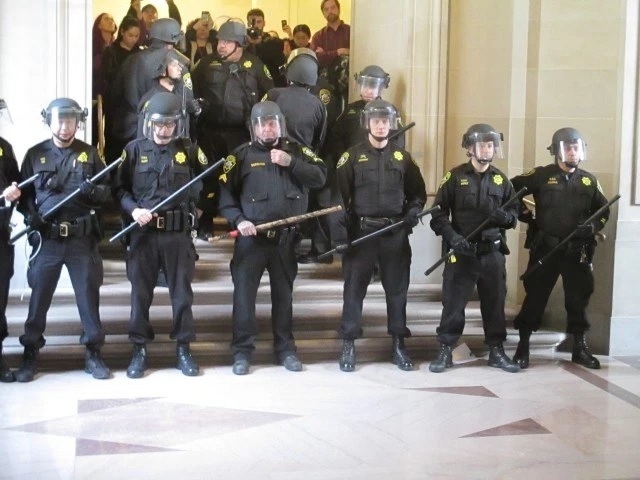
The San Francisco supervisors are going to be moving forward with a series of major police reforms, including a ban on pepper spray and rubber bullets, shifting funding from the Police Department – and possibly including a move to disarm some officers.
The moves, coming in the wake of massive international protests and outrage, could remake policing in San Francisco on a level unseen in decades.

The efforts will also almost certainly set of a massive political battle with the Police Officers Association using every bit of its waning political muscle to try to block major reforms.
Sups. Matt Haney, Shamann Walton, and Hillary Ronen will hold a press conference tomorrow to announce a bill that would prevent the local police from using any of the following for crowd control:
-
Rubber bullets or flexible baton rounds
-
Flash bangs (aka stun grenades)
-
Chemical agents such as tear gas, pepper spray, mace, or OC spray
-
Military vehicles and equipment
Tear gas and pepper spray have been a huge problem for years, but they are even more dangerous today: Recent studies show that the nasty chemicals cause lasting lung damage – and can make people more vulnerable to serious consequences from COVID-19.
And for anyone who thinks “rubber bullets” are safe, they aren’t – these are projectiles with the density of a hockey puck that can maim people for life. From Forbes (of all places):
The British military were well aware of how dangerous these rounds could be and the name was changed to ‘rubber bullet’ to give a ‘slightly humorous image’ and persuade the media that they were ‘nothing more than harmless toys,’ according to the program director for the makers.
The idea of “defunding” the police or disarming some officers isn’t that radical. In most of the United Kingdom, the vast majority of cops don’t carry guns. Same goes for New Zealand, and Iceland, and Norway. Guns are issued only to specially trained officers – who shoot people far, far less often than police do in the US.
That, as Vox notes, is in part due to the massive numbers of guns in private hands in the US. But many of the people shot by cops in this country were carrying no firearm. Some had no weapon at all.
As far as “defunding,” Walton, who is leading the effort, isn’t talking about dismantling the SFPD (as a majority of the Minneapolis City Council has now promised.) He’s talking about using some of the more than $600 million a year that goes to the department for other types of services, particularly in the Black community.
In San Francisco, as in many other places, police officers, armed with guns, are sent to respond to situations that often don’t require a sworn officer and where a gun may actually make things worse.
Cops shouldn’t respond to calls about homeless encampments. They are, for the most part, not properly trained to handle mentally ill people. People call the cops far too often to “report” a Black or Brown person doing something like dancing in the streets, or eating a burrito – and suddenly, large numbers of officers show up with guns.
You don’t need uniformed SFPD officers directing traffic (or siting in their cars) at every fire.
Sending an armed officer into tense situations where there’s little threat to anyone’s life is just a recipe for someone getting hurt or killed.
The police (and many would freely admit this) are the wrong institution to address thousands of situations they are called into every year. If the city were serious about this, there are plenty of models of unarmed public workers who can handle both simple things (like traffic) and complex situations (like mental health crises) far better, at far less cost, and with far less risk of death than police.
I would go even further: A lot of the “detecting” work that cops do could be done just as well by civilians (and in some cases, investigators with a different sort of experience than traditional law enforcement would be much better answer).
The SFPD doesn’t keep very good data in general, but the national data is pretty clear: Some cops are far more likely than others to shoot and kill people – and their violent tendencies can be tracked early on.
The most hotheaded cops tend to be younger ones, and those with excessive force complaints during their first five years are more likely to be involved in unjustified shootings later in their careers. If departments carefully track complaints (as they clearly didn’t in Minneapolis), it’s possible to do early intervention.
Those factors, if they are true in San Francisco, would present an argument for denying guns to cops in their first few years, until the department can make sure that they have no record of excessive force. Older officers who have excessive force complaints could lose their right to carry a gun.
And a little sanity on who is armed and when – most officers don’t need a firearm most of the time to do their jobs – could limit the number of police killings.
Of course, Derek Chauvin didn’t need a gun to kill George Floyd. He used his knee to methodically murder the man, while others looked on.
But in this case, and this case, and this case, and this case, and this case, and so many others, cops who fired guns recklessly left people dead.
And in some of those cases, earlier complaints could have given the SFPD reason to think that the officers would be better off not carrying guns.


